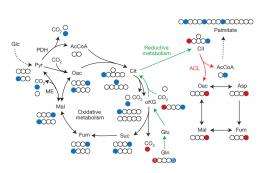New bioengineering prof uncovers cancer metabolism insights

(PhysOrg.com) -- Research from a new member of the bioengineering faculty at the UC San Diego Jacobs School of Engineering demonstrates that our cells metabolize nutrients in a very different manner than has long been thought. According to new research published in the journal Nature by Christian Metallo, an Assistant Professor in the Department of Bioengineering, cells growing under conditions similar to those inside tumors prefer to convert amino acids to lipids rather than carbohydrates. The findings, published online on November 20, 2011, change our fundamental understanding of how cells metabolize glucose and glutamine in order to grow, which was thought to have been settled for more than 50 years. The discovery also means doctors could have a new targets for therapeutic drugs designed to stop cancer cell growth.
Metallo joined the Department of Bioengineering this summer after completing a postdoctoral fellowship on the metabolism of cancer cells – and the research reported in the new Nature study – in the department of chemical engineering at the Massachusetts Institute of Technology. Now at UC San Diego’s Jacobs School of Engineering, Metallo is expanding his focus beyond cancer cells to study the role of cellular metabolism in a wide range of diseases.
“We’re exploring how metabolism controls how our cells function,” said Metallo. “Dysfunctional metabolism is a very important driver of disease, but we often don’t understand the details of what’s going inside the cells and how we can fix the problems that arise when our cells and body are sick. The metabolic pathways we are studying are used by virtually all the cells in our body, so these results actually impact our understanding of metabolism in many different tissues and diseases.”
Metallo likens his work to using the traffic function on Google Maps. The much-used online mapping feature enables users to see whether there are bottlenecks or jams in the flow of traffic, and to identify alternative pathways to take instead. By studying the molecular pathways that cells use to convert nutrients into energy and new cellular parts, researchers are able to visualize how they grow and potentially stop them or get them to change directions.
This work has been limited in the past, says Metallo, because researchers typically study cells in conditions that aren’t very realistic. Cells grown in laboratory environments typically see very high oxygen levels (room air) compared to what is normal inside the body. When cells are placed under low-oxygen conditions that mimic the inside of tumors, Metallo and colleagues found they grow entirely differently. Instead of converting carbohydrates like glucose into lipids for their cell membranes, the cells use amino acids like glutamine for this process. “In a way, this is like switching from a carb-heavy diet to eating protein to make your fat,” said Metallo.
Metallo and collaborators at MIT and Massachusetts General Hospital also demonstrated that this metabolic pathway uses reactions that go in the opposite direction of the well-studied Krebs cycle, which is how cells typically “breath” or respire. In this tumor-like environment, part of this cycle actually goes in reverse, and cells use glutamine to make their cell membranes instead of glucose. However, kidney cells containing a mutated copy of a gene which commonly causes renal cancer always used this metabolic pathway, so enzymes which promote flux through this pathway may be new targets against this form of cancer.
Interestingly, even normal cells placed in these low oxygen environments behaved in this manner, so these findings change our understanding of metabolism in many of the cells in our bodies. “What we’re starting to realize is that most diseases, from cancer to diabetes to neurodegenerative disorders, all have a metabolic component to them,” said Metallo. “What we need to do is understand how a cell or a person or an animal’s metabolism is dysfunctional. That will provide us with an arsenal of new drug targets that we can use to combat disease when things go wrong.”
Provided by University of California - San Diego
















